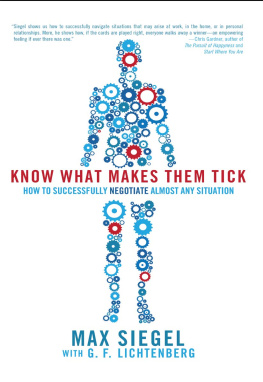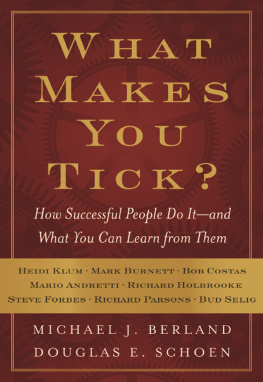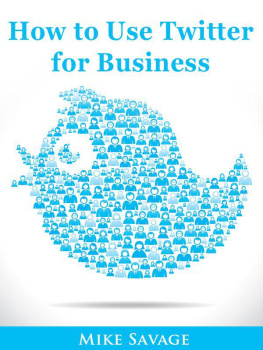PEOPLE ALWAYS ASK ME how I did ithow I got from where I started to where I am today. And to be honest, when someone asks about my success it can still be hard to believe theyre talking about me. Back when I was a teenager in Indianapolis, if you had looked at me from the outside, you would have seen a poor black kid with a Jewish name, a mixed-race boy from a broken homean outsider even among outsiders. My father, who was white, kidnapped my sister and me from my mother, who was African-American; when he died of cancer and she finally found us again, the life she brought us home to was full of addiction and violencestraight ghetto. With a start like that, plenty of people might have expected me to drop out of high school, deal drugs, and end up who knows where. But that wasnt what I did.
I finished high school, then college, then law school, becoming the first African-American to graduate from Notre Dame School of Law with honors. I founded a law firm specializing in sports and entertainment, in time representing Reggie White, the football legend; Tony Gwynn, the greatest hitter in baseball; as well as John P. Kee, Fred Hammond, and other ministers and stars of gospel music. Our success representing musical talent led to the chance to found a small record label that achieved unprecedented sales. In time I became president of Zomba Gospel/Verity Records, the biggest gospel label in the world, and it became one of the most profitable divisions at Sony/ BMG. Industry-wide, Christian music sales doubled to over $700 million a year, with gospel leading the way. Newsweek named me the most important exec in gospel music.
At Sony, I served simultaneously as the senior vice president of the Zomba Label Group and a member of the Presidents Councilthe global management team of Sony BMG Music Entertainmenthelping to handle the affairs of a company that does five to six billion dollars in annual global revenue, and overseeing the careers of stars such as R. Kelly, Justin Timberlake, Usher, and Backstreet Boys. I began receiving invitations to speak on success and diversity at megachurches, legal and business organizations, conferences on music and on sports, and youth organizations.
In the midst of all this, I was approached by Dale Earnhardt Inc. (DEI), the best-known name in NASCAR. As a boy, I grew up hearing the sounds of the cars on the Indianapolis Motor Speedway. I had loved racing since I climbed on my first tricycle, but it was always a sport where the faces were mostly white. Teresa Earnhardt, widow of the greatest driver in the history of the sport and owner of its best-known team, asked me to become their first ever African-American hireas president. Then in 2009, I took over management of NASCARs Drive for Diversity program, working for the entire NASCAR industry to broaden participation at every level and serving as spokesperson for the worlds second-largest sport.
If youre reading this now, its because you want a deeper understanding of success. Of course, you have your own story. It may not sound anything like mine. You may be just starting out, or perhaps you are already well established; you may have more advantages than I did or even fewer; you may have business on your mind or love, family, or spirit. But what I have learned, and what I want to share in this book, is that there are essential rules of success that hold true for us all. They are the rules I discoveredthrough trial and errorfor getting people of all kinds, no matter what their agendas might be, to work with me and to link their successes to mine. How? By tapping into the deep motivations we all share.
What do I mean by deep motivation? I mean the basic human needs and goals that move all of us to commit. Most of the time, they stay hidden. Most small, everyday decisions get made at the surface. For example, if you and I happen to meet today and youre friendly to meif you make me laugh, compliment the talk I just gave, or say something nice about my kidsIll probably chat with you for a while, if I have the time. We may exchange business cards, even say well be in touch. Someone watching us from across the room might think we have a relationship, and we do, but its motivations dont go deep. Theyre all on the surface. Because tomorrow if you call that number on my business card and ask me to give you a job, invest in your business, or fly across the country to help you out of a jam, I may still think youre charming or interesting or funny, but Im going to tell you no. You havent moved me to commit to you.
The only way to change my mind is to appeal to what really moves me, deep downthe reasons I get up in the morning when the alarm goes off, the reasons I keep on going when I feel like Im about to drop. Maybe Im driven to fulfill a dream or to take better care of my family. Maybe I have a passion to express or a moral need to right a wrong. Maybe I have a spiritual calling. Maybe I just want someone to give aabout me. Which is it? What really makes me tick? Thats what you have to know. And when you know it, you need to show me how your success will help me realize those deep goals that motivate me. You need to show me that not as an abstract idea, but as a reality I can feel because its part of everything we do together. If you cant do that, youre not going to get very far with me.
Ive been an outsider for most of my life, but Ive learned that people will work with youwhoever you areif you tap into their deep motivations. They will help you reach your goals, and theyll be glad to do it. Because when you really get at the core of what makes a person tick, what motivates them and makes them feel good about their lives, then you can take care of them. And if you take care of them, they will take care of you. The forces of deep motivation are so strong that anyone who learns my rules can succeed, no matter who you are or where you start out; in fact, as my experience shows, if youre starting out from the wrong place, or if youve had some success but you still feel like an outsider, then that might just become your biggest advantage.
How did I go so far after such a rough start? None of my successes came according to plan, at least not any plan I madeand Ive written dozens of business plans over the years. I got as far as I did by following the rules I will lay out here, rules I learned from some of the worst experiences in my life. Those hard times taught me what makes me tick, and how to work with peoples deep motivations to build a more successful life.
I LEARNED THE FIRST of my rules, know what makes them tick , when I was twelve years old, when I saw my father for the last time. He had always been a strong, proud man, a charmer with a thick head of dark hair and a full mustache, but when the orderlies brought him home from the hospital he was bald and weak and nearly wasted away. They had to carry him up the stairs in his wheelchair, but lifting him was no troublecancer, chemo, and radiation had worn him down to eighty-eight pounds. They rolled him to the table and I sat by him as he said what he had come back home to say. His cancer treatments had failed. I dont want you to see me looking any worse than this, he said, so youre not going to see me again.
I was a kid. I didnt know how to answer him.
Besides his sickness, he was wracked with guilt and full of apologies. He apologized for being gone so long on account of his illness, and for traveling so much as a music salesman back when he was healthy. He apologized for leaving my sister, Traci, and me with my stepmother and all her struggles with drugs and alcohol. Since he went to the hospital, she had been carrying on with one man and then another, leaving no one to look after us. One of my clearest memories of those months was how Traci used to cry because there was no adult in the house to comb her hair. She was still small, but even so she had a sense of style. When her hair got tangled, I combed it out for her.








